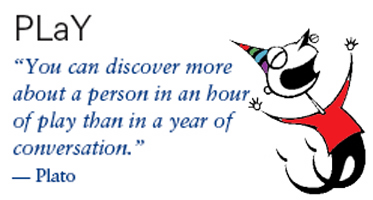
By Charles Schaefer |

n recent years a growing number of noted psychologists and psychiatrists have observed that play is as important to human happiness and well-being as love and work. Some of the greatest thinkers of all time, including Aristotle and Plato, have reflected on why play is such a universal and enduring human behavior.
There are many benefits of play for people of all ages. Since play is such a fun, enjoyable activity, it elevates our spirits and brightens our outlook on life. It expands self-expression, self-knowledge and self-actualization. Play relieves feelings of boredom, connects us to people in a positive way, stimulates creative thinking, regulates our emotions and boosts our egos.
Children in particular use play as an antidote to stress. By actively playing with small toy soldiers, airplanes and tanks, children can miniaturize the frightening images they see on television and gain a sense of power and control over them. The tendency of children to repeatedly play out a scene allows them to slowly mentally digest an overwhelming life experience.
When children play out external events such as war, terrorism or hospitalization, they take advantage of play — the most natural self-healing activity that childhood offers. Children have played war since the days of ancient Egypt and Rome, and toy historians say it is natural for children to re-enact the events of the day. When children play out external events such as war, terrorism or hospitalization, they take advantage of play — the most natural self-healing activity that childhood offers.
As one eight-year-old girl remarked, “In play, I turn myself inside out and give myself a shake, shake, shake, and finally I’m glad all over that I am me.” Play can provide a cathartic release of anxieties and help children (and adults) feel better during tense times.
Parents and teachers can take advantage of the healing powers of play by giving children appropriate play materials (for example, toy spacecraft after the shuttle disaster, blocks for building towers and airplanes after 9/11), time to play and their presence to observe or join in the play as requested.

Play is also widely used by child therapists across the world. Therapists may employ play activities to help children express what is troubling them when they cannot express their thoughts and feelings in words. Through role play, therapists can teach children more adaptive behaviors when there are emotional or social-skills deficits. The positive relationship that develops between therapist and child during play sessions may provide a corrective emotional experience or serve to release the healing powers that lie within the child. Play is also used to promote cognitive development and provide insight about inner conflicts or dysfunctional thinking in the child. There are many ways to use the natural therapeutic powers inherent in play. more ...
FDU Magazine Home | Table of Contents | FDU Home | Alumni Home | Comments
©Copyright 2006 Fairleigh Dickinson University. All rights reserved.
For a print copy of FDU Magazine, featuring this and other stories, contact Rebecca Maxon, editor,
201-692-7024 or maxon@fdu.edu.